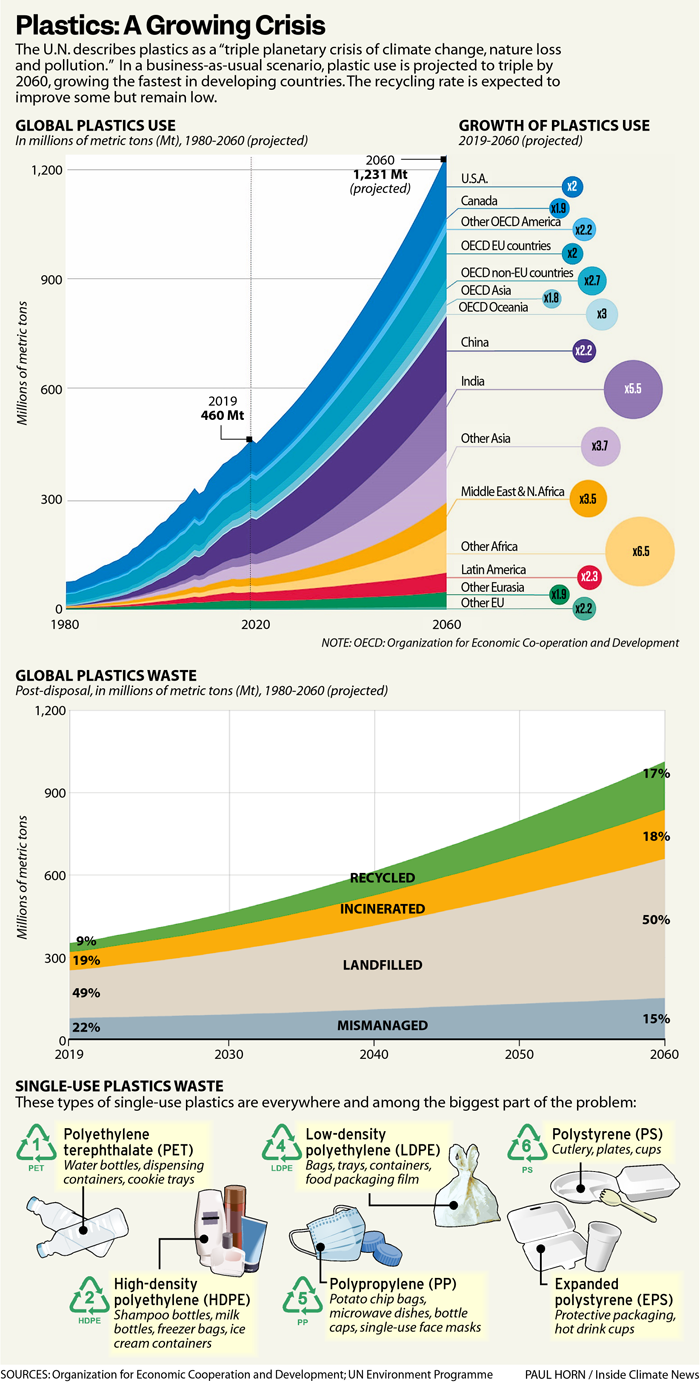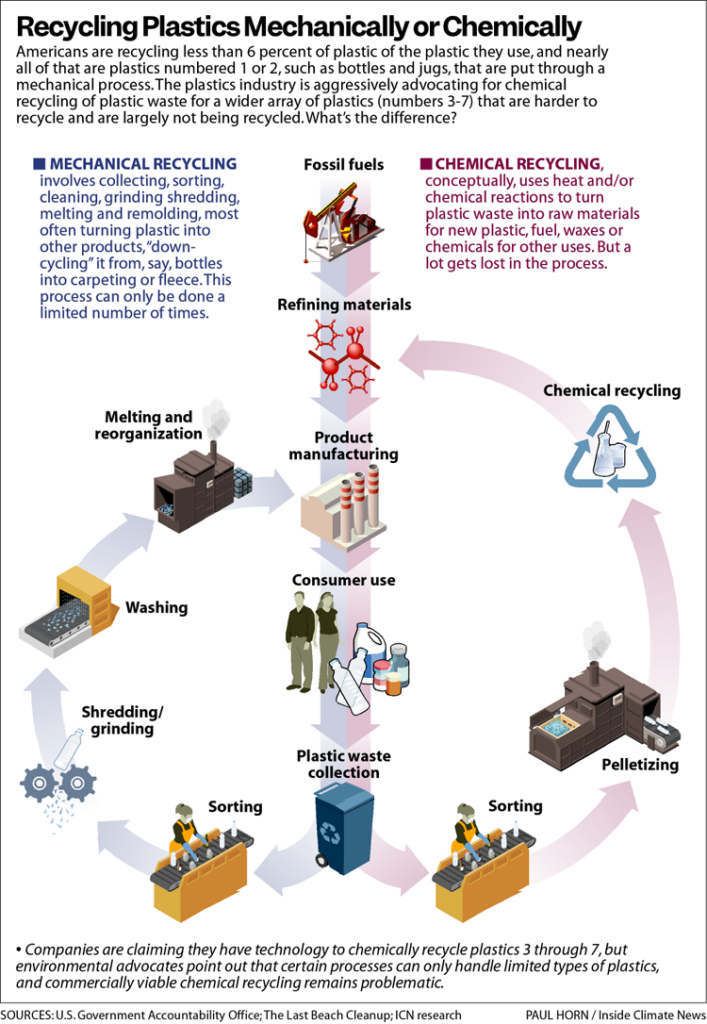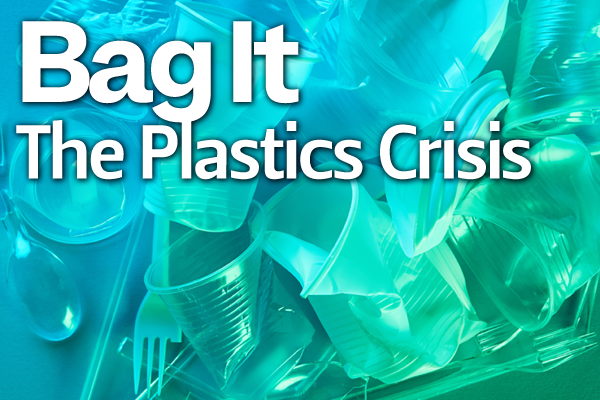Diplomats negotiating guidelines for an international convention on hazardous wastes this month in Switzerland debated a new section on the “chemical recycling” of plastic debris fouling the global environment.
The 1989 Basel Convention, which seeks to protect human health and the environment against the adverse effects of hazardous wastes, was updated in 2019 when 187 ratifying nations agreed to place new restrictions on the management and international movement of plastic wastes—and to update the treaty’s technical guidelines.
Since then, the plastics industry has tried to quell mounting anger over vast mountains of plastics filling landfills and polluting the oceans by advancing chemical recycling as a means of turning discarded plastic products into new plastic feedstocks and fossil fuels like diesel.
Scientists and environmentalists who have studied the largely unproven technology say it is essentially another form of incineration that requires vast stores of energy, has questionable climate benefits, and puts communities and the environment at risk from toxic pollution. Some of them even view the inclusion of the chemical recycling language in the implementing guidelines as a threat, although it remains to be seen what that language will ultimately say.
“The text is nowhere near settled,” said Sirine Rached, the global plastics policy coordinator for the Global Alliance for Incinerator Alternatives (GAIA), which with the Basel Action Network has called chemical recycling of plastics “a fantasy beast that has yet to establish its efficacy and economic viability, while already exhibiting serious environmental threats.”
Rached said the group’s “priority is for the guidance to focus on environmentally-sound management and to refer to technologies only on the basis of sound peer-reviewed references, and not on industry marketing claims, and this involves not speculating on how technologies may or may not evolve in future.”
“The solution is making less plastic,” Judith Enck, founder and president of the environmental group Beyond Plastics and a former EPA regional administrator, told a subcommittee of the Senate Committee on Environment and Public Works at a hearing on Dec. 15.
U.S. lawmakers are weighing their own ideas for addressing the plastics crisis. “We need to cut plastic production by 50 percent in the next 10 years, and we can do it,” she told them, adding that chemical recycling produces “more fossil fuel and the last thing we need is more fossil fuel.”
Such a dramatic cut in plastic would devastate the economy, said Matt Seaholm, chief executive officer of the Plastics Industry Association, which represents companies that produce, use and recycle plastic. “Our industry wants to recycle more,” and deploying more mechanical recycling and chemical recycling will help, he told lawmakers. “We love plastic,” he said. “We hate the waste. We need to collect, sort and ultimately reprocess more material.”

Wide agreement exists that the 11 million metric tons of plastic pollution that enters the oceans every year “is devastating,” Erin Simon, head of plastic waste and business for the World Wildlife Fund, a conservation group that operates in 100 countries, said in an interview. “It’s wreaking havoc on our species, our ecosystems and in the communities that depend on them.
“You really do need this coordinated global structure” that treaties can provide, she added. “Because it’s clear that it’s not going to happen just with voluntary initiatives alone.”
Writing Guidelines for Chemical Recycling
The world is making twice as much plastic waste as it did two decades ago, with most of the discarded materials buried in landfills, burned by incinerators or dumped into the environment, according to the Organization for Economic Co-operation and Development, a group that represents developed nations. Production is expected to triple by 2060. Globally, only 9 percent of plastic waste is successfully recycled, according to OECD.
Nearly all of the plastic that gets recycled goes through a mechanical process involving sorting, grinding, cleaning, melting and remolding, often into other products. But mechanical recycling has its limits; it does not work for most kinds of plastic and what gets recycled, such as certain kinds of bottles and jugs, can only be recycled a few times.
Chemical recycling consists of new and old technologies, hailed by the industry but seen as an unproven marketing ruse by environmentalists, that governments must now study and regulate if they are to successfully confront a menacing problem that spans the Earth and has even invaded our bodies with microplastic particles.

A Basel Convention committee met in the second week of December in Switzerland to debate whether the Basel treaty’s technical guidelines should be updated to include chemical recycling, which is also sometimes referred to as “advanced recycling,” and if so, under what terms.
The debate occurred within the framework of the Basel Convention and any language on chemical recycling that makes it into its technical guidelines will be seen as acceptable tools for managing plastic waste. The guidelines are likely to carry over into the negotiations over the next two years on an international treaty governing plastic pollution and ongoing plastics manufacturing.
Those treaty talks have barely begun, with a first negotiation session among delegates a few weeks ago in Uruguay.
The technical guidelines for the Basel Convention are supposed to represent the best available technology for protecting humans from various hazardous wastes, said Lee Bell, an Australia-based policy advisor for the International Pollutants Elimination Network (IPEN). He is also the co-author of a 2021 IPEN study that detailed how chemical recycling generates dangerous dioxin emissions, produces contaminated fuels and consumes large amounts of energy.
“Many parties and observers are of the view that there is no proof that chemical recycling is what you would call best available technology … or best environmental practice,” he said.
The concern, he said, is that chemical recycling’s inclusion in the technical guidance “becomes a sort of formal endorsement by the (Basel) convention, and therefore by the U.N.”
It then would be possible for advocates of chemical recycling to point to the Basel technical guidance and say, “‘let’s just adopt those wholesale as part of the new plastics treaty,’” Bell said. “And I think this is exactly what’s going on.”
Stewart Harris, senior director of global plastics policy for the American Chemistry Council, said it’s too soon to say what role chemical recycling might play in a global plastics agreement. But, he said, the Basel Convention technical guidance is important.
“The Basel Convention guidance on the environmentally sound management of plastic waste is a key resource for all countries looking to support the transition to a more circular economy for plastics,” Harris said. “Properly classifying chemical recycling will help governments assess how these technologies fit into national waste management plans.”
In a joint release with the International Council of Chemical Associations following the first round of plastics treaty talks, held Nov. 28 to Dec. 2 in Uruguay, the two industry groups favored an agreement that “moves nations closer to a future where plastics remain in the economy and not in the environment.”
Industry opposes caps on soaring plastic production, which Enck and other environmentalists say is the only way to ultimately solve the environmental crisis that is plastic waste and pollution.

In the United States, the fight over chemical recycling has occurred in statehouses, local communities, in Congress and inside the Environmental Protection Agency. The American Chemistry Council, a leading industry advocate for chemical recycling, this year celebrated adoption of legislation by 20 states over the past five years aimed at easing regulatory pathways for chemical recycling.
“The appropriate regulation of this is really critical if you want to scale advanced recycling, and you want to use more recycled material in your products,” Joshua Baca, vice president of plastics for the chemistry council, told Inside Climate News.
But plastics were never designed to be recycled, and environmental advocates have been fighting back, trying to block new chemical recycling facilities that have been proposed in various states across the country.
In Pennsylvania, a Houston start-up called Encina has proposed a $1.1 billion chemical recycling plant for plastic waste in Point Township that has left local officials and professors at Pittsburgh universities perplexed about whether the company’s plans were at all feasible. Nearby residents, meanwhile, worried about impacts to air, water and quality of life.
In northeast Indiana, Inside Climate News found Brightmark Energy struggling to get its chemical recycling facility, using a technology called pyrolysis, up and running. The company could not precisely say what percentage of plastic waste it would actually turn into fuel or plastic feedstocks.

And while Fulcrum BioEnergy does not market its waste-to-jet fuel plant proposed for Gary, Indiana, as chemical recycling, it would employ a similar technical process, gasification. Inside Climate News found that the company’s plans to use municipal solid waste are complicated by an anticipated 30 percent plastic in its feedstock, which reduces carbon benefits and can gum up the production process. In Gary, an environmental justice community, residents have filed a Civil Rights Act complaint with the EPA against the state regulators who approved the Fulcrum air permit.
“Technologies that worsen the climate crisis, perpetuate a reliance on single-use plastics, and adversely impact vulnerable communities cannot be viewed as viable solutions moving forward,” a group of 35 members of Congress wrote in July, urging the EPA to fully regulate chemical recycling emissions and to stop working to promote the technology as a solution to the plastics crisis.
A Global Solution
Plastic waste is a global problem and the countries of the world are working on a global solution.
In March, against the backdrop of what U.N. officials described as a “triple planetary crisis of climate change, nature loss and pollution,” the United Nations Environmental Assembly voted to start two years of negotiations for a treaty to end global plastic waste.
Keep Environmental Journalism Alive
ICN provides award-winning climate coverage free of charge and advertising. We rely on donations from readers like you to keep going.
At the Uruguay meeting, the discussion focused on a process for the negotiations and other preliminary matters. Early fault lines emerged. Some countries favored more of a bottom-up approach in which each of them would set their own goals, while others suggested a harder-line approach with global mandates.
The United States, a major plastics producer and consumer is advocating for a treaty that features national action plans, much like the 2015 Paris climate agreement. (The U.S. did not ratify the Basel Convention on hazardous wastes).
“Plastic pollution does not have a one-size-fits-all solution,” a State Department official said in a written statement. “Many participants emphasized the importance of national action plans under a future agreement and the importance of allowing for country-driven approaches that reflect different national contexts.”
The U.S. approach amounts to “low ambition,” said Neil Tangri, also from the Global Alliance for Incinerator Alternatives. “Every country is already doing what they want to do. The whole point of an international treaty is to get countries to go beyond what they want to do.”
Scientists have also been weighing in on the proposed plastic waste treaty and chemical recycling.
“We know that we’re using more than 10,000 chemicals in everyday plastic products,” said Martin Wagner, a Norwegian University of Science and Technology associate professor of biology, who was among 13 scientists to jointly publish a letter in the journal Science, in November, urging plastics treaty negotiators to recognize the myriad of toxic chemicals that comprise plastic materials. “We know that 2,400 of those chemicals are actually classified as toxic and hazardous.
“Still, they’re allowed to be used in everyday plastic products,” said Wagner, who studies what plastics and endocrine-disrupting chemicals do to human and ecosystem health. “So we have clearly a shortcoming there with regards to regulating hazardous chemicals and plastics.”
Wagner was also among nine scientists to write another letter in Science in April, advocating for a global cap on plastic production.

Capping plastic production will increase the price of making new plastics, and would then make recycling more economical, while helping to end plastic pollution, he said.
Chemical recycling likely needs to be in the mix of potential solutions, but it raises a lot of questions, Wagner said.
“It’s unclear how (chemical recycling) would scale to deal with the mega- and gigatons of plastic waste that we are producing,” he said. “And then there is the problem of chemical safety. And technically, I really don’t understand how they would get rid of all those chemicals.
“That’s why I’m cautious about promoting this chemical recycling as a silver bullet solution. It has a role to play but I am not sure how big of one.”
Continuing the Negotiations, But with Skepticism
At the Basel Convention meeting in mid-December in Switzerland, environmental groups watched closely as a committee worked on language for the proposed new section on chemical recycling. Those conversations were kept confidential.
Environmental groups such as the International Pollutants Elimination Network, the Global Alliance for Incinerator Alternatives and the Basel Action Network have tried, without success, to keep the committee from including chemical recycling in the technical guidelines.
Another Basel working group will pick up the talks in February, before delegates from countries that are parties to the Basel treaty meet in May, where the technical guidelines could be resolved.
For now, however, records from the technical committee meeting show language inserted to interject a measure of skepticism about solutions from chemical recycling. For example, one change notes that “further scientific evidence for the ecological and economic benefits is still necessary for final evaluation.”
Even the United States, which is not a party to the Basel Convention but participates in an advisory role, urged cautionary language around chemical recycling in the Basel technical guidelines.
“Given the uncertainty about the environmental impacts of chemical recycling and the role the technology can play in addressing plastic waste, we support the guidelines highlighting that further evidence is needed to assess the life cycle impacts of chemical recycling processes and demonstrate commercial viability,” a U.S. official suggested.
Plastic recyclers in Europe offer a mixed assessment of chemical recycling.
“Chemical recycling could have the potential to build upon mechanical recycling processes if it can treat the waste which currently cannot be mechanically recycled into high-quality plastics,” said Emilia Tarlowska, a spokeswoman for Plastics Recyclers Europe, a group representing European recyclers that closely follows the U.N. deliberations.
But she also said that “chemical recycling is in its infancy” and barely out of the “laboratory.”
“It is perhaps too early to tell if these technologies have the potential to significantly contribute to the challenges presented by plastics waste,” she said.
For its part, the U.N. Environment Program, in a document prepared in advance of the plastics treaty talks in Uruguay, identified chemical and mechanical recycling as two main ways for “closing the loop of plastics in the economy,” or getting away from a linear “take-make-waste” model.
“Chemical recycling includes a wide array of technologies that for the most part are not yet proven at scale,” the text said. “Chemical recycling tends to be energy intensive and should only be used when the overall environmental profile is comparable to or better than other proven management options.”


